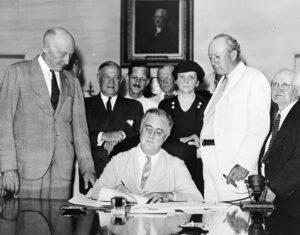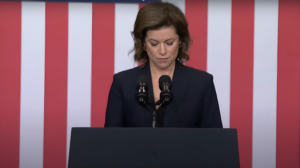By Charles Hoffacker
Founded in 1905, the Dutch Treat Club in New York City is a luncheon club of writers, artists, illustrators, publishers, media gurus and performers in music, television, and film. Over the years, the membership has included such notable figures as Isaac Asimov, Jimmy Cagney, George M. Cohan, Walter Cronkite, Ogden Nash, Norman Rockwell, and four United States presidents.
In 1945, after Harry Truman had succeeded to the presidency and Frances Perkins had retired as Secretary of Labor, Perkins addressed the Dutch Treat Club. In one section of her address, she looked back over the past fifty years to recognize that the rise in public interest in economic security and social justice was due in large part to people like the members of the Dutch Treat Club.
Perkins went on to speak of novelists, writers of magazine articles, authors of non-fiction works, and painters. Those mentioned by name included Edward Bellamy, author of the best-selling futuristic novel Looking Backward; Jacob Riis whose illustrated work How the Other Half Lives remains in print in multiple editions; and painters George Bellows and John Sloan, whose subjects included the urban poor. In contrast to such visionary artists and writers, she spoke of “the plodding fellow like myself who comes along behind and lays the bricks and does the job.” But what an imposing edifice Frances Perkins and her fellow workers raised up during their time!
In reflecting back on the previous half century, she also mentioned three religious leaders, national figures whose names would be known to many at the Dutch Treat Club event. They were Charles Henry Brent, James Huntington, and John A. Ryan. Who were they, and what did they do that Frances Perkins included them among those who laid groundwork across the nation for what came to be the New Deal?
Perkins spoke of “the days when Bishop Brent was just stirring the social consciousness of those who claimed they were Christians.”
Charles Henry Brent (1862-1929),born in Canada and ordained an Anglican priest there, served in Buffalo then in Boston, where he made friends with Christian Socialists and leaders of the settlement movement. In 1901 he became the Episcopal Church’s first missionary bishop in the Philippines. There he launched a crusade against opium traffic and went on to organize the first international conference on the drug trade. Brent served as Senior Chaplain of the American Expeditionary Forces in World War I. In 1918 he accepted election as Bishop of Western New York. One of his major commitments was to the cause of Christian unity: he presided over the pioneering World Conference on Faith and Order held in Lausanne, Switzerland in 1927, which helped establish the modern Ecumenical Movement. Brent is also remembered as a prolific author and an exceptional person of prayer.
The historian James Thayer Addison celebrated Bishop Brent in these words: “a saint of disciplined mental vigor, one whom soldiers were proud to salute and whom children were happy to play with, who could dominate a parliament and minister to an invalid, a priest and bishop who gloried in the heritage of his Church, yet who stood among all [Christians] as one who served . . . . He was everywhere an ambassador for Christ.”
In his first book, God in the World (1900), Brent wrote, “God never considers [people] apart from, but always as part of, a great social order–a social order that is not a concourse of independent units, but a body instinct with life, a society which is not an organization but an organism.”
Frances Perkins spoke of when “Father Huntington had just founded the Church League for Industrial Democracy.”
James Otis Sargent Huntington, OHC (1854-1935) was an Episcopal priest who worked on New York City’s Lower East Side in the 1880s, ministering among poor immigrants. He went on to help found the Order of the Holy Cross, the first indigenous religious order for men in the Episcopal Church, and took his life vows in 1884. He served as the superior of the order several times and maintained an energetic ministry of teaching, preaching, and spiritual direction until his death in 1935. The Order of the Holy Cross continues as an international monastic community in the Benedictine tradition with which many people are affiliated as associates.
Father Huntington was deeply involved in the social issues of his time and encouraged the Episcopal Church to address them, asserting that the Church must be on the side of the poor “if she is to live at all.” He repeatedly called attention to inadequate wages and substandard conditions for factory workers. Huntington participated in groups such as the Church Association for the Advancement of the Interests of Labor (CAIL), which arbitrated strikes, promoted legislation to abolish child labor in New York State, and investigated conditions in tenements and factories.
In the Rule for his community, Father Huntington wrote: “Holiness is the brightness of divine love, and love is never idle; it must accomplish great things.”
Frances Perkins also spoke of when John Ryan “was writing books about the living wage, and he was setting down the concepts of a just wage as a wage which would support the people who worked for that wage, would support them in decency and enable them also to contribute to the charity which was their right and their duty to others.”
John A. Ryan (1869-1945) was a Roman Catholic priest and economist who lived much of his life in Washington, D.C. There he engaged in a three-part ministry: as a professor at Catholic University and Trinity College, as chairman of the Social Action Department of the National Catholic Welfare Council, and as an opinion maker and policy advocate who promoted Catholic Social Teaching among U.S. Catholics and the wider American public. Supporters and critics agree that he formulated an effective platform for the U.S. Catholic Church’s engagement in public issues during the first half of the twentieth century.
Ryan’s interest in questions of social justice for an industrial society was strengthened when he read Pope Leo XIII’s Rerum Novarum (1891), the first of the series of social encyclicals that includes On Care for Our Common Home (2015) issued by Pope Francis. Of his many books, the most influential was probably the first, A Living Wage (1906), which addressed just wages for industrial workers, a centerpiece issue throughout his career.
In a 1934 article, Monsignor Ryan came out in support of the New Deal. It “implies an economic system which is neither individualism nor socialism,” he wrote. “It assures the abolition of the anarchy and manifold injustices of the former and avoids the political despotism and economic inefficiency of the latter.” The Roosevelt presidency was still new, but he decided to support publicly an administration more committed to social change than any other in American history, and he never regretted this decision.
While Ryan staunchly supported the New Deal, he did not directly contribute to it, despite a persistent myth to the contrary. His own encounters and correspondence with Franklin Roosevelt were very limited, and he had no contacts inside the White House. Ryan was close to Frances Perkins, however, and his writings must have influenced her.
In his introduction to the Penguin Classics edition of Frances Perkins’ The Roosevelt I Knew, Adam Cohen correctly declaresthat “Perkins was a brilliant self-creation: There had not been anyone like her before and there has not been anyone like her since.” Still, by her own admission, the nation was prepared for her contributions by a variety of other people, among them novelists, writers of magazine articles, authors of non-fiction works, and painters. She also noted three national religious leaders who helped pave the way, each of them an engaging figure: Charles Henry Brent, James Huntington, and John A. Ryan.
The Rev. Charles Hoffacker is an Episcopal priest and a board member of the Frances Perkins Center.


